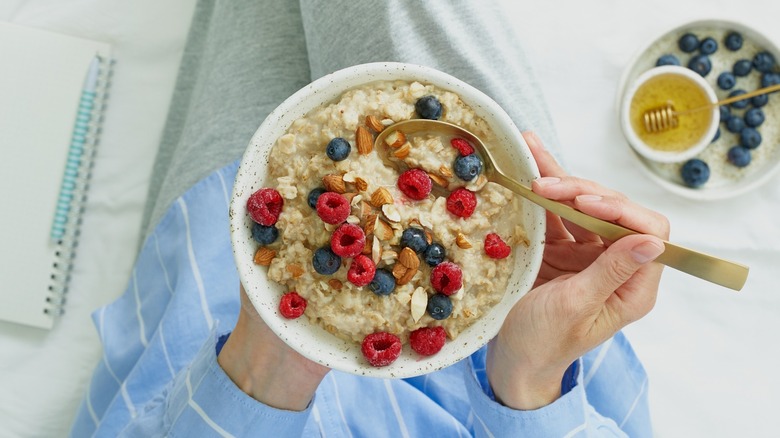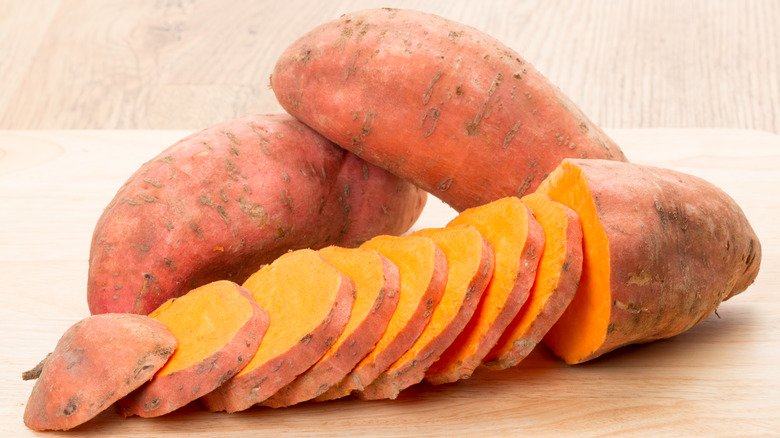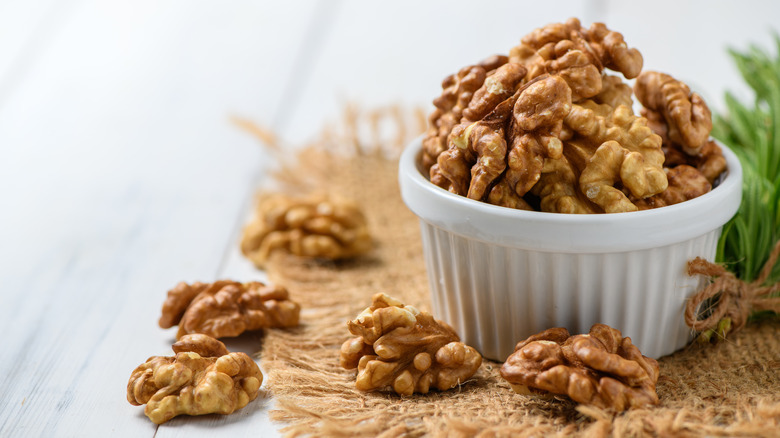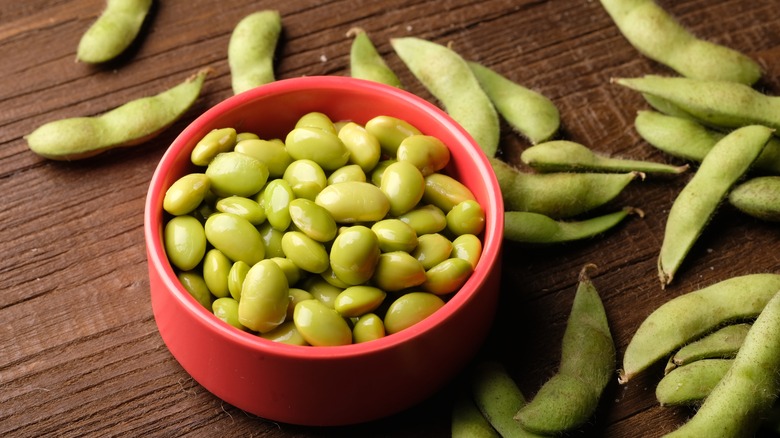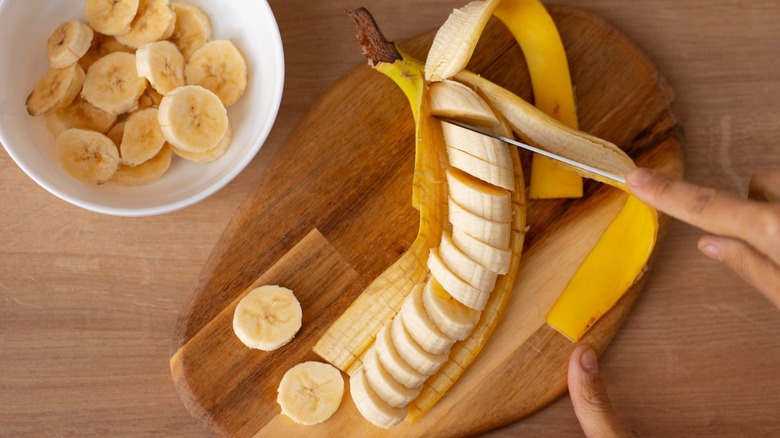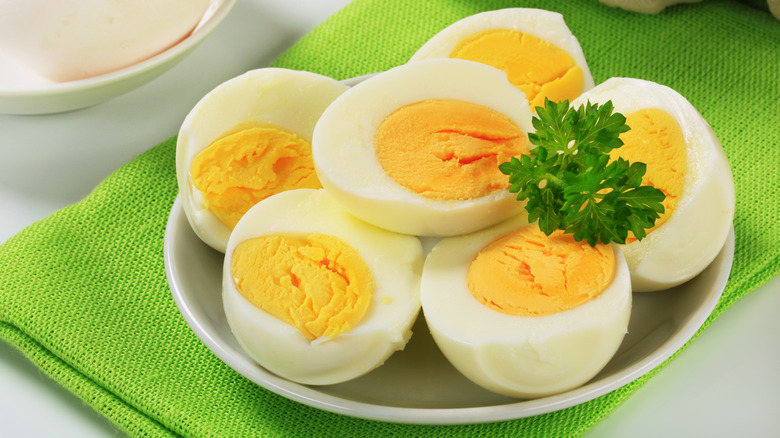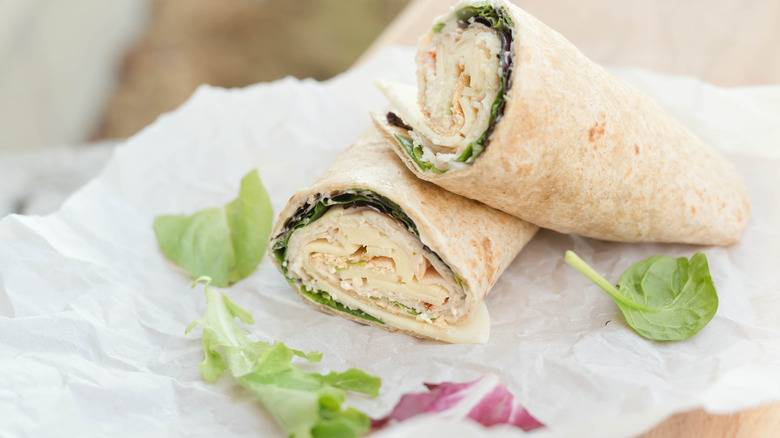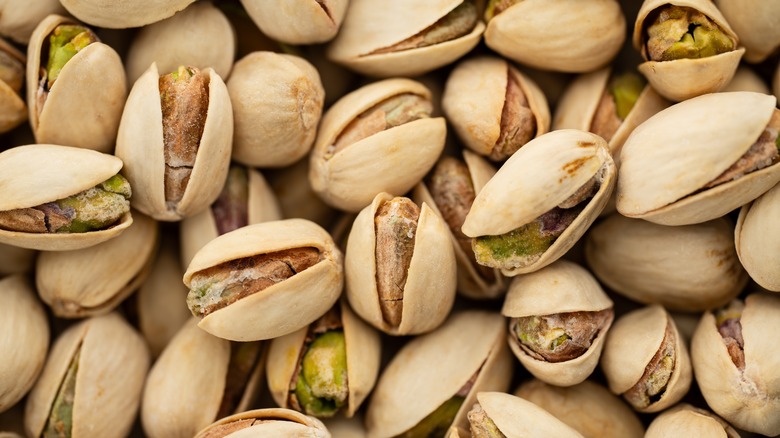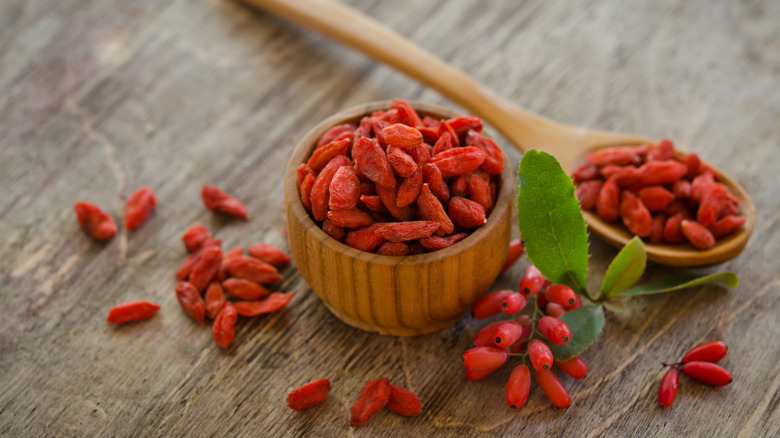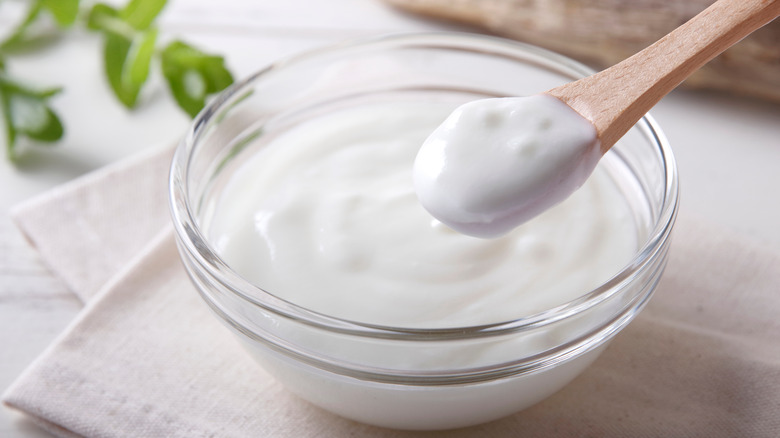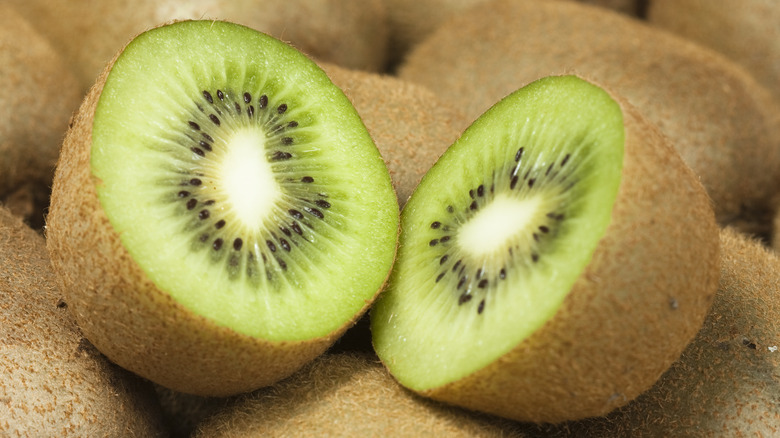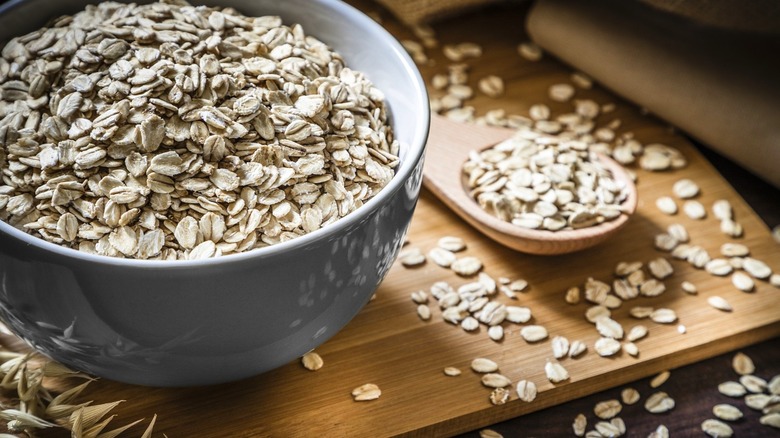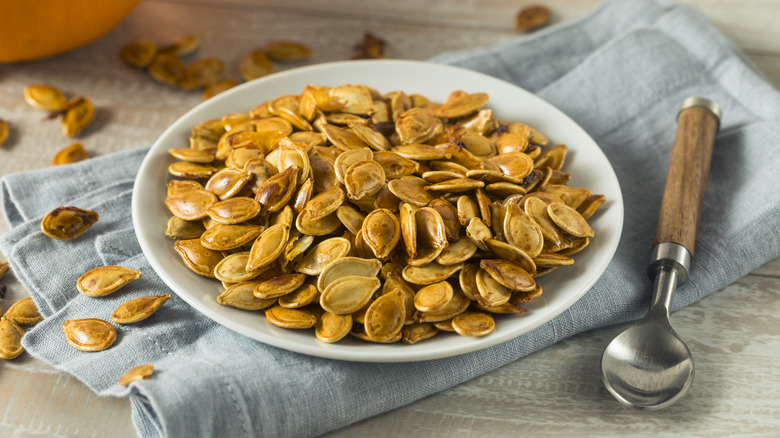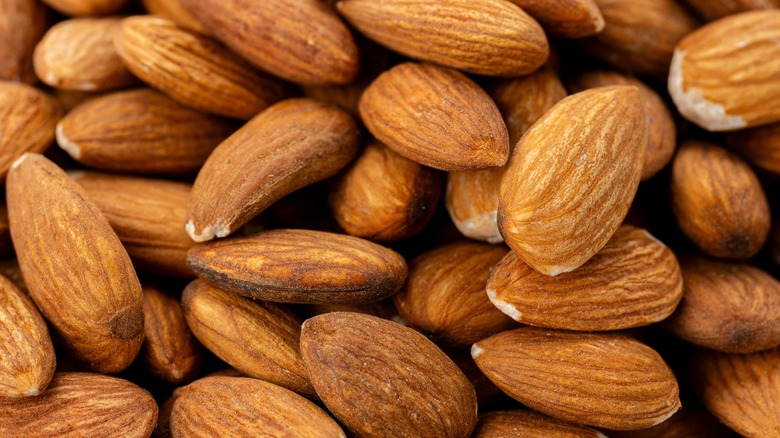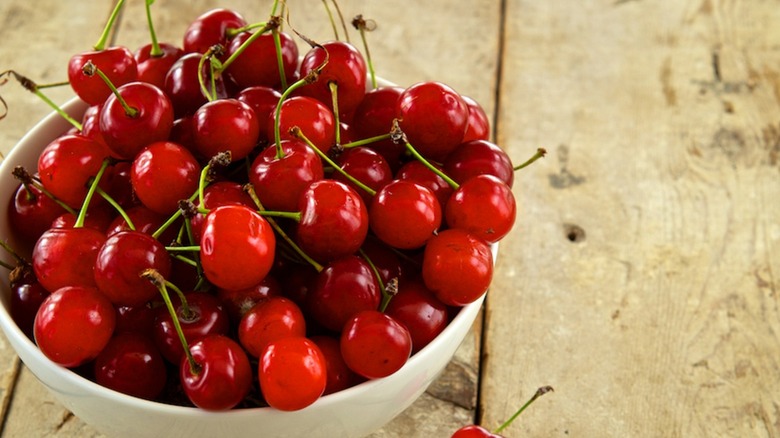The 14 Absolute Best Snacks To Eat Before Bed
Munchies before bedtime aren't anything new — we're all prone to snacking before we get some shut-eye. But there are so many rules, like avoiding caffeine, not eating sweets, and staying away from acidic or spicy foods. And it makes sense, as choosing the wrong snacks before we go to bed can significantly impact our overall sleep quality and well-being.
When it comes to snacking at night, it's all about giving our bodies the right nutrients — as well as enough time — to ensure a restful night's sleep. You don't have to cut back on all food right before bed. According to Sleep Foundation, it helps to stop eating around two to four hours before trying to fall asleep. If anything, doing this will help prevent indigestion.
Finding the best snacks to eat before bed means finding a delicate balance between satisfying your cravings and ingesting sleep-friendly ingredients. Here, we'll delve into what kind of snacks offer both comfort and health benefits, ultimately helping you to drift off into sleep.
1. Sweet potatoes
Sweet potatoes are a great source of nutrition. They even contain nutrients that could help you sleep better. Sweet potatoes contain vitamin B6, vitamin C, and complex carbohydrates, according to Healthline. While carbs sometimes get a bad rap, research has shown that carbohydrates can help increase serotonin levels in the brain. This is particularly helpful for a pre-bed snack because serotonin is a neurotransmitter that plays a crucial role in regulating mood and sleep.
As far as the vitamins, studies have found that B vitamins, in particular, can potentially help with sleep. When taken as a supplement, vitamin B6 can promote better sleep. If consumed through foods like sweet potatoes, your body has just as good of a chance of getting that vitamin. Furthermore, vitamin C, which is known for boosting your immune system, can help you get to sleep. Some research has shown that vitamin C can help you sleep longer and even hinder the effects of sleep apnea.
It's also been proven in studies that magnesium combats insomnia. As the United States Department of Agriculture explains, just one average sweet potato has around 32 milligrams of magnesium. For a snack, we recommend eating some homemade sweet potato chips before bed.
2. Walnuts
Incorporating a small handful of walnuts into your evening snack routine — or adding them to meals such as salad or oatmeal — can be a tasty way to support better sleep. Studies have found that walnuts actually contain some melatonin, the hormone that regulates the sleep-wake cycle, which your body absorbs when eating the nuts. Plus, walnuts contain omega-3 fatty acids, which help produce DHA, which in turn increases serotonin in your brain, reports Healthline.
In addition to fatty acids, walnuts also contain an abundance of magnesium and fiber — a cup of halved nuts has 6.7 grams of dietary fiber and a whopping 158 milligrams of magnesium, according to the USDA. Magnesium is known to help with muscle relaxation, leading to better sleep. Fiber can help keep you feeling full and prevent overeating before bed, as well as maintain stable blood sugar levels throughout the night, explains the Centers for Disease Control and Prevention. There's even a chance that walnuts could steer you away from junk food by combating cravings because your body is more satiated from the dietary fiber in the nuts.
3. Edamame
To start, a cup of edamame has about 416 milligrams of tryptophan, reports My Food Data. Tryptophan is an amino acid that can help with sleep disorders by aiding in the brain's production of both serotonin and melatonin. In addition to tryptophan, edamame's nutrient content can indirectly promote better sleep. These nutrients can benefit overall health and reduce factors that could disrupt sleep, such as hunger, muscle discomfort, or inflammation.
According to Healthline, edamame contains a balanced combination of carbohydrates, protein, and fiber, all of which can curb hunger and stabilize blood sugar. It also contains magnesium, which can reduce the likelihood of muscle cramps and restless leg syndrome. Finally, edamame is rich in antioxidants, particularly isoflavones. Some studies have found that isoflavones have anti-inflammatory properties. Since inflammation can interrupt sleep, consuming edamame, even a few hours before you go to bed, is a good way to combat this issue.
4. Bananas
Bananas are also packed with pectin, as Healthline reports, which is known to satiate hunger and keep you feeling full, which could help you sleep longer. They're also rich in several essential vitamins and nutrients, a few of which can help your body relax, rejuvenate, and coast off to sleep. The fruit is a great source of magnesium, vitamin B6, vitamin C, tryptophan, and water.
Having ample vitamin B6 in your body is necessary for converting tryptophan into serotonin, explains Healthline. There's nearly 0.5 milligrams of vitamin B6 in a banana, according to the USDA. What's more, one banana has about 34 milligrams of magnesium, 11 milligrams of vitamin C, and 94 grams of water. Magnesium and vitamin C can help your body relax and recuperate by easing your muscles and supporting your immune system, respectively. Additionally, the fact that bananas contain water is beneficial, as hydration is essential for maintaining bodily functions, including those involved in sleep. Suffice it to say snacking on a banana before bed can help promote better sleep just by taking care of your body.
5. Hard-boiled eggs
Easy to make, hard-boiled eggs are a perfect snack to help you get to sleep. Eggs can help you get a better night's rest because they have a small amount of tryptophan, but also because they naturally have melatonin. A larger-sized egg has about 77 milligrams of tryptophan, explains My Food Data. That might not be as much as other foods, but it still can make a difference in sleep patterns. Eggs are also a good source of calcium. There are about 25 milligrams in one egg, according to the USDA, which can help manage melatonin in your body. Sauder Eggs reports that the melatonin and calcium in eggs can create stability in your sleep.
Studies have also proven that eggs are an excellent source of high-quality protein, and incorporating protein-rich snacks into your evening diet can reduce late-night hunger and prevent sleep disruptions. Additionally, eggs provide vitamins D and B12, and minerals like iron and zinc, all of which are essential for overall health and energy production, indirectly supporting sleep.
6. Turkey and spinach wraps
While eating a full turkey dinner before bed is not advised, in smaller doses, turkey is a great food to help you get some sleep. Turkey is high in protein and tryptophan, and these nutrients can help your body get some solid rest, according to Healthline. That makes turkey a good option to include in a bedtime snack, such as a turkey wrap with spinach.
Spinach is a superfood, which means that it's high in various essential nutrients. Spinach contains a rather high amount of potassium and vitamin A, explains the USDA. Moreover, spinach also contains omega-3 fatty acids, magnesium, dietary fiber, as well as several B vitamins, all of which can improve your health, making you more likely to sleep better. This leafy green also contains folate. As some studies report, folate (also known as vitamin B9) has been linked to the reduction of insomnia. Having enough folate can enable serotonin production, helping to aid in your sleep.
Spinach and turkey each contain nutrients that can improve your overall health and help you sleep. Wrap both up in a whole grain tortilla, which boasts of its own dietary fiber and complex carbs, and you've got a healthful snack that can also warrant a better night's rest.
7. Pistachios
In addition to being a nut that is overall good for your health, pistachios are an ideal snack to indulge in before sleeping. Pistachios contain melatonin, according to Healthline, which helps your body rest for longer. The nuts also have antioxidants, unsaturated fatty acids, and a whole lot of potassium, which all contribute to their anti-inflammatory properties, explains WebMD. By preventing or reducing the symptoms of inflammation, especially if you have chronic inflammation, you're more likely to get proper sleep.
Moreover, as the USDA reports, a cup of unsalted pistachios is an excellent source of protein (24.8 grams) to keep you fuller at bedtime, magnesium (149 milligrams) to relax your body, and calcium (129 milligrams), which helps your body make tryptophan, according to Medical News Today.
Plus, pistachios are often sold in their shells, so they take time to de-shell and eat. This can prevent you from eating too many of them before bed — like we're prone to do with salty junk food — keeping you satiated but not overstuffed.
8. Goji berries
If you aren't familiar with the goji berries, they're an oblong berry that somewhat resembles a grape tomato, and their tart flavor has been compared to that of sour cranberries. You can eat them fresh or dried or mix them in smoothies.
Despite being part of the nightshade family, goji berries are not only safe to eat, but they're rather healthy. They are packed with vitamin A, which supports both your organs and immune system. Additionally, these berries also contain melatonin in higher amounts than other berries, which, of course, aids with sleep.
In addition to combating oxidative stress, Medical News Today explains how they can also improve your mood and help you feel more calm, therefore promoting better sleep. Plus, goji berries are often used in traditional Chinese medicine, where the berries are seen as an adaptogen, which means they may help the body adapt to stress and maintain balance.
9. Yogurt
Yogurt has plenty of nutrients that can contribute to better rest, from important probiotics to vitamins and minerals, such as calcium and vitamin D. This pre-bedtime snack contains live probiotic cultures that are known to support gut health, according to Healthline. A healthy gut microbiome has been linked to various aspects of health, including mood regulation. By managing stress and anxiety, a balanced gut can incidentally encourage sleep. Additionally, this study has linked together the support of the gut microbiota with the metabolism of tryptophan, solidifying why snacks like yogurt can help you get some shut-eye.
Plain yogurt has plenty of calcium. It's been proven in studies that calcium has a direct effect on brain function and sleep, especially when eating it. Vitamin D, also found in yogurt, contributes to better sleep cycles. This study shows that a lack of the vitamin has been connected to sleep disturbances. Besides how yogurt can ease you into sleep, it's also an easy snack to prepare, as it's ready to eat and can be enjoyed by itself.
10. Kiwis
Kiwis are a deliciously juicy and hydrating bedtime snack. They're also rich in nutrients, and many of these vitamins and minerals can lead to better sleep. Just one kiwi has a rather astounding amount of potassium (215 milligrams) as well as a good amount of vitamin C (64 milligrams), magnesium (11.7 milligrams), and calcium (23.5 milligrams), all of which can keep the immune system healthy and help with muscle relaxation, explains Medical News Today. Kiwis also contain folate, which helps with mood stabilization, thereby helping you rest with less stress or mood-related disturbances during the night or before bedtime.
Studies have discussed how the fruit also naturally contains both melatonin and serotonin, so consuming kiwis — especially in the evening — may help signal to your body that it's time to sleep. Then, when you consider the antioxidants kiwis have, it's clear the fruit is truly a powerhouse, as other studies have shown that eating antioxidant-rich fruits can improve sleep. Eating kiwi by itself or adding a few to a yogurt bowl or smoothie to enjoy before bed is a great way to encourage rest.
11. Oats
Eating oats provides your body with various nutrients. While they might not be appealing when eaten plain, a bowl of oatmeal makes a great pre-bed snack. Whatever way you enjoy them, oats can give your body the nutrients and the rest it needs. First, they're an excellent source of fiber and protein. Both can help to curb hunger, keeping you asleep throughout the night.
Additionally, oats also have about 13% of the daily value needed for magnesium, plus a little bit of folate, potassium, calcium, and vitamin B6, according to Healthline. Even in smaller doses, these vitamins and minerals can support your body and help you get to sleep.
Registered dietitian Lauren Manaker explains to Well+Good that oats are a great source of melatonin. Though the amount is dependent on how the oats were grown, eating it can ensure your body gets at least a little melatonin. If you're not too big on the soft texture of oatmeal, you can get the same benefits from oats through granola, and there are plenty of ways to elevate store-bought granola.
12. Pumpkin seeds
Antioxidant-rich pumpkin seeds, called pepitas when shell-less, are equally tasty and nutritious. Pumpkin seeds are one of the best plant-based sources of magnesium (they provide about 40% of the recommended daily intake), which can reduce muscle cramps that can keep you awake at night, explains Healthline.
Plus, the dietary fiber and healthy fats in these seeds can prevent digestive discomfort and keep you satiated. Eating snacks that have healthy fats and fiber can prevent overeating, which can lead to an upset stomach. Just a handful or so of pumpkin seeds will do the trick, and you won't feel as inclined to keep snacking on other foods before trying to fall asleep.
Pumpkin seeds also have tryptophan, which your body can't produce on its own, and will make you feel more relaxed. While a good handful of this snack can satiate your hunger, you'll need more than that to get a good dose of tryptophan. The average handful equates to around 1 ounce, and according to Healthline, you'll need closer to 6 ounces to get an adequate amount of tryptophan.
13. Almonds
Like most nuts, almonds are rich in protein, healthy fats, and fiber, all of which can contribute to good sleep by keeping you satiated. But almonds also contain high amounts of melatonin, according to Medical News Today, as well as tryptophan and magnesium, which can directly affect sleep by helping your body relax.
Moreover, almonds are one of the best dietary sources of vitamin E, an antioxidant that helps reduce oxidative stress and inflammation in the body, explains Web MD. Lowering inflammation may improve sleep by minimizing discomfort and pain.
Additionally, almonds have a low glycemic index, meaning they release sugar into the bloodstream slowly. This helps prevent rapid spikes and crashes in blood sugar levels, reducing the likelihood of waking up in the middle of the night due to hunger or discomfort. Combined with their high fiber content, the tree nuts are more than filling enough to snack on before bed.
14. Cherries
Cherries, particularly tart cherries, have various health benefits, and their role in promoting better sleep is well-documented. They are a natural source of tryptophan and melatonin, meaning that consuming cherries or cherry juice can help you get better sleep, reports Cleveland Health. Furthermore, cherries are packed with antioxidants, such as anthocyanins and quercetin, which possess anti-inflammatory properties.
In addition, cherries are a rich source of potassium, a mineral known to help regulate blood pressure, which can prevent nighttime spikes. They also have fiber, which aids in preventing nighttime indigestion that can keep you awake, as well as magnesium, which helps relax your muscles to ease you into sleep. Moreover, they contain vitamins A and C, which support your immune system, and a healthy body warrants healthier sleep.
Plus, cherries are naturally sweet, making them a soothing and delicious snack whether eating them by hand or drinking a glass of cherry juice. It's important to remember, however, that finding fresh cherry juice with little to no added sugar is essential when enjoying the snack before bed. Even with their sleep-supportive nutrients, high sugar content could combat those efforts, as it could keep you awake for longer or worsen your sleep.
